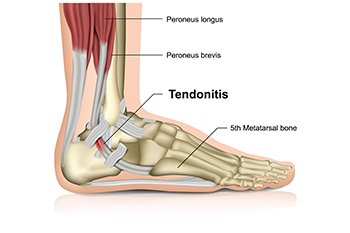
In the realm of sports and physical activities, one crucial yet vulnerable component often overlooked is the Achilles tendon. Nestled at the back of our heels, this strong band of tissue connects the calf muscles to the heel bone, enabling us to walk, run, and jump. Achilles tendon injuries, though seemingly commonplace, can be debilitating and require extensive recovery periods. These injuries, often stemming from overuse, inadequate warm-up routines, or sudden increases in intensity, can be excruciatingly painful. Such injuries are prevalent among athletes, especially runners and basketball players. This type of injury can result from poor footwear choices or biomechanical imbalances. Understanding the factors that contribute to Achilles tendon injuries is beneficial in successful prevention. If you have incurred an Achilles tendon injury, it is suggested that you speak with a chiropodist as quickly as possible who can accurately diagnose and treat you.
Achilles tendonitis is a common injury of the Achilles tendon, a band of fibrous tissue that runs along the back of the lower leg. The Achilles tendon can also rupture, making it impossible to lift the foot. If you are suffering from heel or calf pain, please consult with Chiropodist Stephanie Poupore from North Bay Foot & Ankle. Our clinician can help you maintain the health of your lower limbs and your mobility.
Causes of Achilles tendon injuries include:
Repetitive stress or overuse
Sudden increase in activity levels
High impact injury
Calf muscle tightness or weakness
Altered foot biomechanics
Heel bone spurs
Underlying medical conditions that weaken the tendon
Symptoms of an Achilles tendon injury include:
Heel and calf pain that worsens following exercise
Chronic heel and calf pain
Sudden pain in the back of the ankle or calf
A popping or snapping sensation
Thickened lump in the Achilles tendon
Ankle and calf stiffness
Decreased range of motion in the affected foot
Swelling
Difficulty walking
Treatment
Resting the affected leg
Applying ice
Compressing the foot and ankle
Elevating the injured leg
Wearing orthotics
Low impact exercises
Stretches
Strengthening exercises
Non-steroidal anti-inflammatory medications
Cortisone injections
Surgery, if the tendon is ruptured
Achilles tendon injuries can be very painful and lead to reduced mobility if left untreated. If you have any questions, please feel free to contact our office located in . We offer the newest diagnostic and treatment technologies for all your foot care needs.
